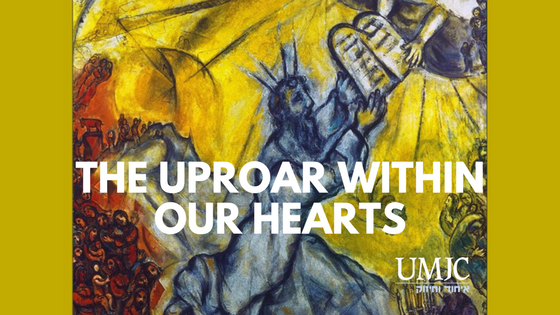The Uproar Within Our Hearts
Parshat Yitro, Exodus 18:1–20:23
Rabbi Isaac Roussel, Congregation Zera Avraham
The parasha this week contains that momentous occasion when our people received the Torah at Mount Sinai. Due to the centrality of this pivotal moment in Jewish history, the rabbis have scrutinized, pondered, and debated every minute detail. One of the questions that they asked was, “How did they know that it was God speaking to them?” This seems like a fair and good question. We tend to just accept the story at face value. But our sages express their love of the text by taking nothing for granted. They put the text into a metaphorical olive press, seeking to squeeze out every drop of spiritual insight. I greatly admire this approach.
I particularly resonate with the answers to this question provided out of the Hasidic world. They speak of the divine spark within each one of us reaching out, seeking to connect to its Creator. Rabbi Tzadok HaKohen of Lublin wrote that when it says there were sounds at Mount Sinai (Exod 20:18) it was “the beginning of the uproar in a person’s heart to become attached to God, blessed is he.”
Another expression of this thought is based on the tradition that at Sinai God only spoke the first letter (Aleph) of the first word (Anochi, which means “I”). The first words of the Ten Commandments are, “I am Adonai, your God, who brought you out of the land of Egypt.” With just the utterance of the silent Aleph, Israel was so infused by God’s divine radiance that they finished the Decalogue. The Ropshitzer Rebbe wrote, “The souls of Israel awakened and their inner holiness awakened, and they yelled at the top of their lungs: ‘I am Adonai, your God!’ For the [divine] part extends out from its source.”
Some streams of religious thought emphasize the sinfulness of humanity, sometimes almost to the point of forgetting that we are created in God’s image. Yes, we are tainted and sinful creatures, but at our core there is goodness. This is the part of us that God’s voice reaches out to. It is the uproar in our hearts, responding to that Voice.
Our tradition speaks of the wrestling of two inclinations in each of us; yetzer ha-tov and yetzer ha-ra; the good inclination and evil inclination. We tend to think of this as two equal forces warring with one another. But I contend that, in reality, we are yetzer ha-tov at our core, and it is the invading force of sinfulness that is yetzer ha-ra which seeks to attack and subdue it. (Sadly, it all too often wins.)
This is why Yeshua loved and reached out to such people as tax collectors and prostitutes. He saw through the sin and saw the image of God hidden within them. They were lost lambs, but still lambs nonetheless. His lost lambs. And he was willing to go to great lengths to recover them.
This is why God says in Sefer Devarim (Deuteronomy) that the Torah is not beyond the sea or in the heavens, but in our mouths and in our hearts.
This is why Rav Shaul writes that there are those who have obeyed the ethical principles of Torah, without knowing it (Rom 2).
We often think of Hashem’s voice calling out to us from afar. But I contend that he speaks from deep within us. He speaks to that core which is created in his image. His words well up inside of us, if we let them.
In Pirke Avot, it states that every day God’s voice radiates out from Mount Sinai. It is that original silent aleph, still reverberating throughout the cosmos. How do we hear it? The Hasidic masters say that “if one purifies himself with Torah and mitzvot, one constantly hears the voice of God, as during the revelation at Mount Sinai.”
They also point out that it doesn’t say “Moses said” but instead it says, “Moses would say.” Why? Because Moses “is destined to speak in every generation to anyone that is willing to purify himself and to take upon himself the yoke of Torah.”
We are indeed sinful creatures. We indeed are constantly under attack by our yetzer ha-ra. But at our core we are created in God’s image.
May we hear that silent aleph radiating out daily from Sinai.
May we hear that Voice welling up from deep within.
May our hearts ignite in uproar in response.
May we live a life dedicated to Torah and mitzvot, so that our souls will join in with that heavenly chorus declaring that God is indeed Adonai!
Shabbat Shalom.

